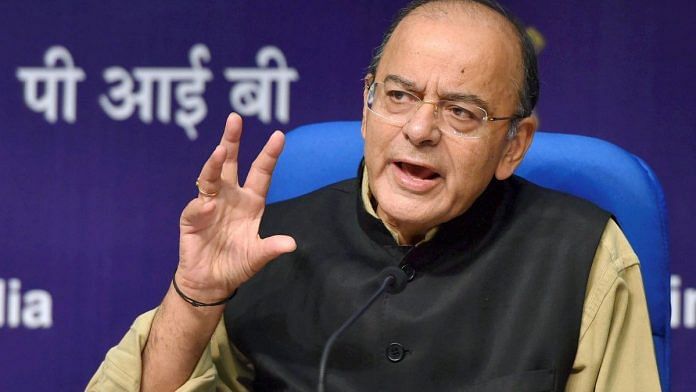Jaitley said demonetisation has strengthened the economy and increased the government resources to fund poverty alleviation and infrastructure development programmes.
New Delhi: Hitting back at the Opposition for criticising demonetisation, Finance Minister Arun Jaitley Thursday said the “prophets of doom” have been “conclusively proved wrong” with India retaining its position as the fastest growing economy for the fifth year in a row.
Many opposition leaders have been critical of the Prime Minister Narendra Modi’s move to demonetise high-value currency notes two years ago.
Responding to noteban critics, Jaitley said demonetisation has strengthen the economy and increased the government resources to fund poverty alleviation and infrastructure development programmes.
“What has happened to ‘prophets of doom’ who said India’s GDP will decline by at least 2 per cent. For the fifth year running, India will be the fastest growing (large) economy in the world. It is continuing to happen. So prophets of doom have been proved wrong and conclusively proved wrong,” he told reporters here.
Earlier, Jaitley in a Facebook post said demonetisation has helped in formalising the economy, expanding tax base and earmarking more resources for the poor.
On the controversial noteban decision, former Prime Minister Manmohan Singh said “scars and wounds” caused by demonetisation are getting more visible with time and second anniversary is a day to remember how “economic misadventures” could roil the nation.
Describing demonetisation as an “ill-fated” and “ill-thought” exercise, he said the havoc it unleashed on the Indian economy and society is now evident to everyone.
The senior Congress leader had earlier said that demonetisation would shave off 2 per cent economic growth rate.
Among other opposition leaders, Aam Aadmi Party (AAP) convener and Delhi Chief Minister Arvind Kejriwal also questioned the rationale behind the Modi government’s note ban move and termed it as “a self-inflicted deep wound” on the Indian economy.
Joining the chorus, West Bengal Chief Minister Mamata Banerjee alleged that the demonetisation move was initiated for the benefit of a handful of people, saying the common men were the worst sufferers.
Congress’s spokesperson Anand Sharma, at a press conference, also alleged that demonetisation was “a big money laundering project”.
The Modi government on November 8, 2016, demonetised high value currency notes of old 500 and 1000 rupee notes, constituting 86 per cent of the currency in circulation.
Defending the demonetisation drive, Jaitley said, “Even when there was global stress, we still manage to have respectable growth rates and we had the courage because of leadership of the Prime Minister… we took decisive steps and these steps which are not economically correct have helped the system in the long run, and the long run in this case does not mean generations,” he said.
The finance minister said that demonetisation has favourably impacted tax system, digitisation and formalisation of the India economy.
“Of course, there is a long distance we still have to cover and I am certain in the coming years the advantage of these movements in the right direction will strengthen the India economy,” he said.
Giving details of impact of demonetisation, Jaitley said the number of income tax return filers has gone up to 6.86 crore from 3.8 crore in May 2014.
“By the time the first five years of this government are over, we will be close to doubling the assessee base, he said.
He further said with the implementation of the goods and services tax (GST), it is now becoming increasingly difficult to evade the tax system and the indirect tax to gross domestic product (GDP) ratio has gone up to 5.4 per cent post GST, from 4.4 per cent in 2014-15.
On the criticism that almost the entire cash money got deposited in the banks post demonetisation, Jaitley said confiscation of currency was not an objective of demonetisation.
“Getting it into the formal economy and making the holders pay tax was the broader objective. The system required to be shaken in order to make India move from cash to digital transactions. This would obviously have an impact on higher tax revenue and a higher tax base,” Jaitley said. –PTI



